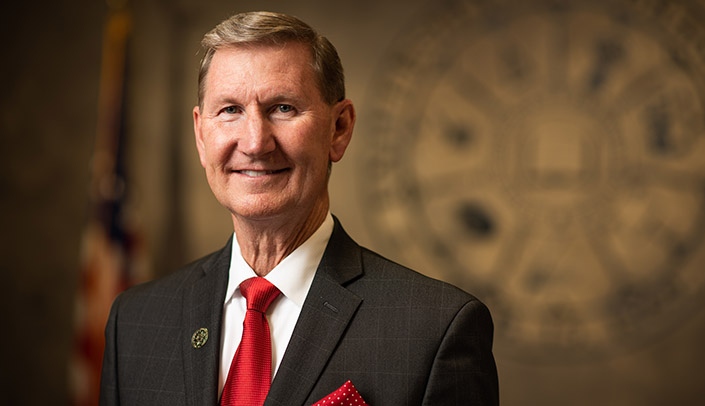In a message sent to the university community on April 14, University of Nebraska President Ted Carter and the university chancellors acknowledged that the university would not be immune to the economic pain being felt around the world and across higher education as a result of the COVID-19 pandemic.
“Unexpected costs and revenue losses associated with COVID-19 will create significant budgetary challenges for us,” the message read. “While there are too many unknowns at this stage to fully quantify the impact, housing refunds, athletic and event cancellations, frontline health care costs and other factors will result in a shortfall of at least $50 million this fiscal year. And as we prepare for next year’s budget, which begins in just over two months, our revenues are likely to take a significant hit even under the very best of circumstances.”
The university will meet the challenge with the care, collaboration and discipline necessary to maintain excellence and accessibility, the leaders said. “We anticipate difficult conversations ahead, but we will be guided at every step by our mission to provide world-class education, research and service to people in Nebraska and beyond.”
The message highlighted several steps now being taken across the University of Nebraska system:
- Like many colleges and universities, the university has implemented a hiring freeze, with exceptions only for urgent mission-critical positions.
- Each campus and central administration will reduce spending by 3% in the final quarter of this fiscal year.
- Travel and major purchases are limited to those that are time-sensitive.
- All capital construction projects are being reviewed to determine whether any can be delayed.
“Each of these steps is designed to preserve as much cash as possible in the short term to help us address the challenges ahead,” the message read.
“We know some of you may be wondering what this means for salaries, or whether programmatic cuts are coming. We hope to have a clearer sense of our next steps once state tax receipts and other budgetary factors are known. Our elected leaders have been candid that they will have to grapple with significant financial challenges of their own. We will be a good partner, and we appreciate that state leaders have historically recognized the importance of an affordable and high-quality university.”
The leaders also highlighted some good news, including:
- University leaders have been diligent and proactive in planning.
- The recently passed federal CARES Act will provide some degree of relief to students and campuses. While awaiting further guidance from the Department of Education on the use of these dollars, university leaders have agreed that student support, enrollment and retention strategies, and mitigation of COVID-19 expenses will be among the priorities for resource allocation.
- Every opportunity to make a University of Nebraska education even more accessible for its 51,000 students and future generations of young people is being explored. Tuition rates, the lowest in the Big Ten and well below peer institutions, remain competitive. With Nebraskans, like many Americans, struggling in the current environment, several affordability initiatives are being explored.
“The final piece of good news is that even in this dramatically altered landscape, the work that you do every day has never been more important to the success and vitality of our state and the world,” the message reads. “This pandemic will end. When it does, we have an opportunity to be a university system that got it right — a university that put students and employees first, that addressed challenges thoughtfully, and that looked over the horizon and considered its leadership opportunities in the ‘next normal’ for higher education.
“Capturing those opportunities will depend on our resolve and unity now. We know we have asked a great deal of you as we have adjusted together to our new reality. We ask you to keep taking care of each other, your families and yourselves. We will continue to update you on these important conversations for the future of our university.”
